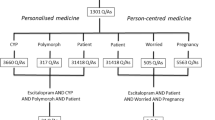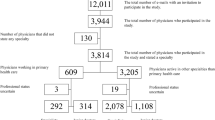Abstract
Purpose
Problem-oriented drug information (POD) is a service in which health professionals provide evidence-based answers to clinical questions posed by physicians. The objective of this study was to evaluate the user satisfaction and clinical impact of POD, to investigate predictors for use and to examine the kind of sources physicians search before applying for POD.
Methods
To evaluate POD, a questionnaire was distributed with problem-oriented answers sent from a drug information centre to physicians during the period of April 2006 to March 2007.
Results
Of 197 questionnaires, 183 (93%) were returned. The information from the POD service was highly valued by the physicians, and 90% of the answers led to reported impact on clinical practice in the specific clinical situation. Furthermore, 74% of the answers were intended to be used in a wider context either for future patients (67%) or for dissemination to colleagues (51%). Secondary-care physicians more often than general practitioners (GPs) used the information for dissemination to colleagues (63 vs. 39%, P = 0.0008), while GPs more often used the answer to support patient information (88 vs. 70%, P = 0.0029). The most prominent motive for applying for POD was a request for evidence-based information (78%), and the service was used to overcome barriers to practicing evidence-based medicine such as lack of time (36%), skills for searching (26%), and appraising the literature (13%). Before inquiring, 74% of the physicians had tried other information sources; the most frequent sources used were a drug reference (68%) and consulting a colleague (24%). Secondary-care physicians reported fewer barriers than GPs when seeking information, and secondary-care physicians searched other sources more often than GPs before contacting the service (81 vs. 67%, P = 0.031).
Conclusion
POD represents a useful source for acquiring evidence-based drug information by physicians. POD is highly valued by the users. It was reported to have an impact on clinical practice for the specific patient but is also intended to be used in a wider context for future patients or for dissemination to colleagues. GPs’ and secondary-care physicians’ use of POD differs with GPs having more focus on patient information and secondary-care physicians having more focus on dissemination of the information to colleagues.
Similar content being viewed by others
References
Davies K (2007) The information-seeking behaviour of doctors: a review of the evidence. Health Info Libr J 24:78–94
Boissel JP, Amsallem E, Cucherat M et al (2004) Bridging the gap between therapeutic research results and physician prescribing decisions: knowledge transfer, a prerequisite to knowledge translation. Eur J Clin Pharmacol 60:609–616
Coumou HC, Meijman FJ (2006) How do primary care physicians seek answers to clinical questions? A literature review. J Med Libr Assoc 94:55–60
Shuval K, Shachak A, Linn S et al (2007) The impact of an evidence-based medicine educational intervention on primary care physicians: a qualitative study. J Gen Intern Med 22:327–331
McColl A, Smith H, White P et al (1998) General practitioner’s perceptions of the route to evidence based medicine: a questionnaire survey. BMJ 316:361–365
Dawes M, Sampson U (2003) Knowledge management in clinical practice: a systematic review of information seeking behavior in physicians. Int J Med Inform 71:9–15
Oliveri RS, Gluud C, Wille-Jorgensen PA (2004) Hospital doctors’ self-rated skills in and use of evidence-based medicine — a questionnaire survey. J Eval Clin Pract 10:219–226
Alper BS, White DS, Ge B (2005) Physicians answer more clinical questions and change clinical decisions more often with synthesized evidence: a randomized trial in primary care. Ann Fam Med 3:507–513
Patel MR, Schardt CM, Sanders LL et al (2006) Randomized trial for answers to clinical questions: evaluating a pre-appraised versus a MEDLINE search protocol. J Med Libr Assoc 94:382–387
Koonce TY, Giuse NB, Todd P (2004) Evidence-based databases versus primary medical literature: an in-house investigation on their optimal use. J Med Libr Assoc 92:407–411
Ely JW, Osheroff JA, Ebell MH et al (2002) Obstacles to answering doctors’ questions about patient care with evidence: qualitative study. BMJ 324:710
Ohman B, Lyrvall HS, Tornqvist E et al (1992) Clinical pharmacology and the provision of drug information. Eur J Clin Pharmacol 42:563–567
Follath F, Meier C, Grimm E (1990) Computer-assisted drug information. Schweiz Med Wochenschr 120:1845–1848
Hedegaard U, Damkier P (2004) Clinical–pharmacological counseling in Odense, 1997–2003. Ugeskr Laeger 166:4030–4032
Schjott J, Pomp E, Gedde-Dahl A (2002) Quality and impact of problem-oriented drug information: a method to change clinical practice among physicians? Eur J Clin Pharmacol 57:897–902
Lyrvall HS (1994) The impact and use of problem-oriented drug information directed toward health staff. PhD Thesis, Department of Clinical Pharmacology, Karolinska Institute, Huddinge University Hospital
Hands D, Stephens M, Brown D (2002) A systematic review of the clinical and economic impact of drug information services on patient outcome. Pharm World Sci 24:132–138
Verhoeven AA, Schuling J (2004) Effect of an evidence-based answering service on GPs and their patients: a pilot study. Health Info Libr J 21(Suppl 2):27–35
Brassey J, Elwyn G, Price C et al (2001) Just in time information for clinicians: a questionnaire evaluation of the ATTRACT project. BMJ 322:529–530
Swinglehurst DA, Pierce M, Fuller JC (2001) A clinical informaticist to support primary care decision making. Qual Health Care 10:245–249
Hayward JA, Wearne SM, Middleton PF et al (1999) Providing evidence-based answers to clinical questions. A pilot information service for general practitioners. Med J Aust 171:547–550
Schilling LM, Steiner JF, Lundahl K et al (2005) Residents’ patient-specific clinical questions: opportunities for evidence-based learning. Acad Med 80:51–56
Stark R, Helenius IM, Schimming LM et al (2007) Real-time EBM: from bed board to keyboard and back. J Gen Intern Med 22:1656–1660
Van DD, Aertgeerts B, Hannes K et al (2007) Online on-the-spot searching increases use of evidence during consultations in family practice. Patient Educ Couns 68:61–65
Waldorff FB, Hermann C (2004) Rational decision making for the general practitioner: the effect of courses in Internet-based searches. Ugeskr Laeger 166:2054–2057
Bennett NL, Casebeer LL, Kristofco R et al (2005) Family physicians’ information seeking behaviors: a survey comparison with other specialties. BMC Med Inf Decis Making 5:9
Covell DG, Uman GC, Manning PR (1985) Information needs in office practice: are they being met? Ann Intern Med 103:596–599
Lyrvall HS, Nordin C, Jonsson E et al (1993) Potential savings of consulting a drug information center. Ann Pharmacother 27:1540
Kinky DE, Erush SC, Laskin MS et al (1999) Economic impact of a drug information service. Ann Pharmacother 33:11–16
Acknowledgements
The qualitative interviews reported herein form part of a dissertation by Inger Stenstrøm Rasmussen for the M.Sc. degree (Master of Health Science). The authors wish to thank Henrik Horneberg for proofreading; Helle Nielsen, Susanne Moland and Thomas S. Christensen for technical assistance; and Dorthe Dideriksen and Kim Brøsen for carefully reading the manuscript.
Author information
Authors and Affiliations
Corresponding author
Rights and permissions
About this article
Cite this article
Hedegaard, U., Damkier, P. Problem-oriented drug information: physicians’ expectations and impact on clinical practice. Eur J Clin Pharmacol 65, 515–522 (2009). https://doi.org/10.1007/s00228-008-0604-5
Received:
Accepted:
Published:
Issue Date:
DOI: https://doi.org/10.1007/s00228-008-0604-5




